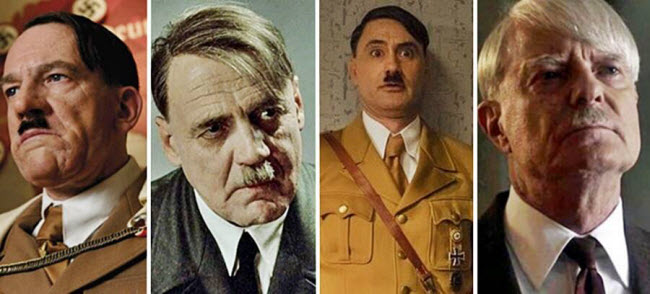Adolf Hitler is undeniably one of the most significant figures in modern history, whose racist ideologies and aggressive policies led to the deaths and displacement of millions and redrew the world’s map. It is therefore not surprising that many actors have attempted to portray this complex character in various artistic forms, whether dramatic or documentary. Each portrayal presents a challenge, balancing between humanizing him to elicit some empathy from the audience or depicting him as a monstrous figure to deepen public disdain. Some actors have succeeded and received acclaim from critics and audiences alike, while others have fallen short. In this article, we explore ten of the most notable portrayals of Hitler.
Charlie Chaplin – The Great Dictator

The first portrayal of Hitler came from the creative genius Charlie Chaplin in the 1940 film “The Great Dictator.” In this film, Chaplin played two roles: a Jewish barber and a dictator ruling the country like the Führer. Known for his satirical style, Chaplin’s portrayal was released at the onset of World War II and faced initial resistance from cinema executives concerned about provoking a crisis between the United States, which had not yet entered the war, and Germany. Despite this, the film achieved significant commercial and critical success upon its release.
The story revolves around a Jewish barber who suffers from amnesia after participating in World War I and returns home to find the country under the control of a dictator named “Hinkel,” clearly a satire of Adolf Hitler. The barber’s friends exploit his resemblance to the dictator to overthrow the tyrant, resulting in a comedic mix-up where the benevolent barber replaces the dictator.
Chaplin later remarked that had he known the real horrors of the German concentration camps, he would not have made “The Great Dictator,” as it would have been impossible to mock the Nazis’ murderous madness.
Anthony Hopkins – The Bunker
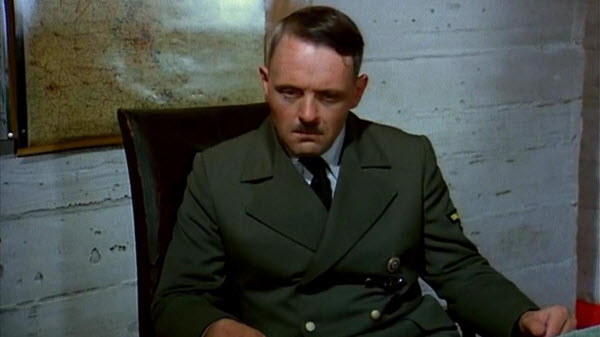
Long before Anthony Hopkins portrayed the cannibalistic Dr. Hannibal Lecter in “The Silence of the Lambs,” the veteran actor took on the bold role of Nazi leader Hitler in the 1981 TV film “The Bunker,” which aired on CBS. The film focuses on Hitler’s last days hiding in his bunker with his new bride, Eva Braun, before his suicide in 1945.
The film was highly praised for its powerful depiction of the dictator’s final days and included many historical details unknown to many. Hopkins’ performance was noted for his intense immersion into the role, so much so that it created tension between him and other actors due to his method acting approach. It is no surprise that he won an Emmy for this role, even though his portrayal was in a Welsh accent.
Ian McKellen – Countdown to War
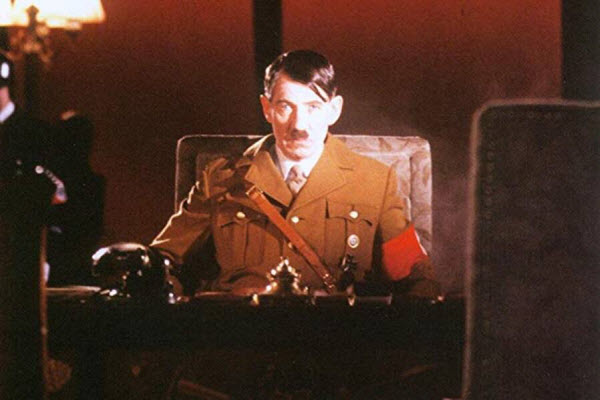
Portraying historical figures is not new for veteran actor Ian McKellen, who has played controversial characters like Amadeus, Othello, and Macbeth. However, none were as challenging as his portrayal of Adolf Hitler in the 1989 film “Countdown to War,” which depicts the days leading up to France and Britain declaring war on Germany. The film was based on private letters, diaries, and records of meetings involving the German dictator at that time.
To fully embody the character, McKellen conducted extensive research and felt that he had to dissect Hitler’s character to portray him authentically, even if it meant developing a degree of empathy towards him.
Alec Guinness – The Last Ten Days
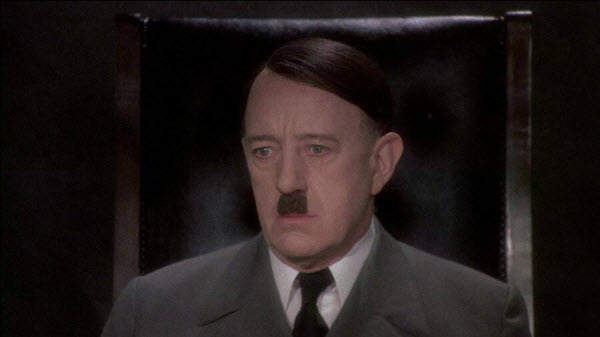
Alec Guinness was one of the first prominent actors to take on the role of Adolf Hitler since Charlie Chaplin’s “The Great Dictator.” Unlike Chaplin, Guinness’s portrayal in the 1973 film “The Last Ten Days” was dramatic and documentary-style, focusing on Hitler’s final days after the Nazis’ surrender in World War II.
Guinness immersed himself deeply in the role, even requesting the production company to insure him against assassination attempts due to fears of public backlash for his portrayal. He stated to The New York Times, “I have to present Hitler truthfully, or there is no point in playing him.”
Noah Taylor – Max and Preacher

Noah Taylor is the only actor known to have played Adolf Hitler twice, first in the 2002 film “Max” and then again 15 years later in the comedy series “Preacher.”
In “Max,” Taylor portrays the young Hitler whose artistic ambitions are thwarted by his inner rage, while in “Preacher,” he plays a comedic version of Hitler working in a sandwich shop under the alias “Dave.” Taylor aimed to depict the character as malevolent, noting that fascists despise being ridiculed.
Bruno Ganz – Downfall
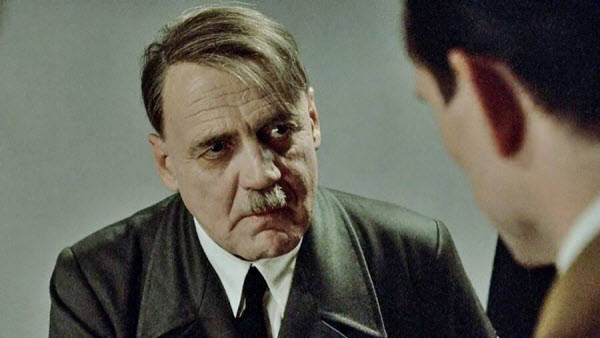
Bruno Ganz’s portrayal in the 2004 film “Downfall” might be the most famous depiction of the German dictator. The film, produced by a German team, was controversial for its portrayal of Hitler, as many viewed it as a shift in the German public’s stance on Nazi history—a highly sensitive topic for the country.
The film presents a strangely humane version of Hitler as a complex character, which led Ganz to admit in interviews that he felt pity for Hitler to some extent. This portrayal was met with significant criticism, including from historian Ian Kershaw, who questioned the benefits of presenting such a humanized image of Hitler, arguing it did not contribute to a better understanding of the dictator despite the film’s quality.
Wolf Moser – The Man in the High Castle

Another German actor who dared to take on the role of Führer was Wolf Moser in the series “The Man in the High Castle.” Unlike other portrayals, Moser’s Hitler is elderly and isolated in a mysterious castle in an alternate world where the Axis powers triumphed over the Allies in World War II.
The series blends history and science fiction, and many actors admitted they struggled with filming the Nazi symbols during the early episodes. However, the show received positive feedback for its portrayal of how evil can seamlessly blend with ordinary life when given the opportunity.
Martin Wuttke – Inglourious Basterds

Though Martin Wuttke’s portrayal of Hitler in Quentin Tarantino’s 2009 film “Inglourious Basterds” is a secondary character, it offered a new, satirical take on the dictator in the new millennium. Wuttke’s Hitler is depicted as a volatile leader, and it is clear that he did not emphasize any humane aspects of the character.
Robert Carlyle – Hitler: The Rise of Evil
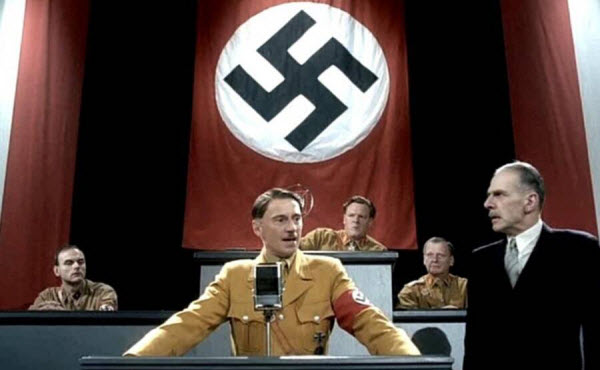
The 2003 film “Hitler: The Rise of Evil” is one of the most unusual entries on this list, largely because actor Robert Carlyle, known for his comedic roles, was cast as Hitler. Carlyle’s portrayal in this mini-series, which follows Hitler from childhood in Austria to his rise as a dictator, was seen as a surprising choice but ultimately delivered a powerful performance.
Carlyle admitted the role was challenging as he had never portrayed a historical figure before. He stated the project aimed to explore how Hitler’s experiences led him to become one of history’s most reviled figures, though critics noted historical inaccuracies and a reluctance to delve deeply into the Nazi war crimes, focusing instead on Germany’s development during his reign.
Taika Waititi – Jojo Rabbit
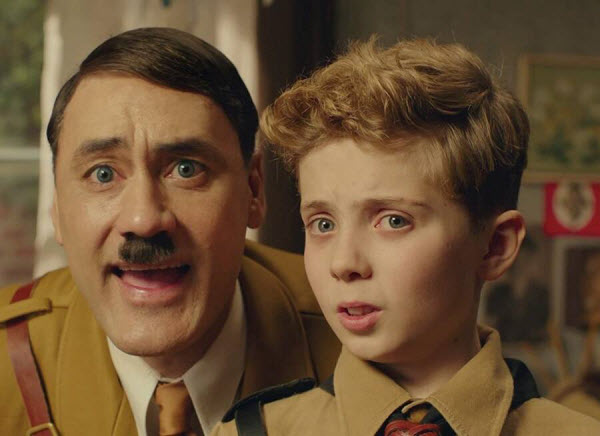
Another comedic portrayal of the Nazi leader is found in the 2019 film “Jojo Rabbit,” where Taika Waititi plays a fictional version of Hitler as an imaginary friend to a young German boy training to be a member of the Hitler Youth.
According to Canadian news, Waititi’s portrayal was peculiar, given that he was both the actor and director. His performance was entirely comedic, and he admitted to refusing to research the dictator as a matter of principle, stating he had no interest in presenting Hitler authentically because he did not want to make Hitler feel content that someone studied him.
Despite the use of comedy to address the Nazi theme, the film faced criticism but won the Audience Award for Best Film at the 2019 Toronto International Film Festival.
Portraying one of history’s most infamous villains is undoubtedly challenging for writers, actors, and directors. As we have seen, each portrayal of Hitler has been unique. Which one, in your opinion, was the most compelling and convincing?
